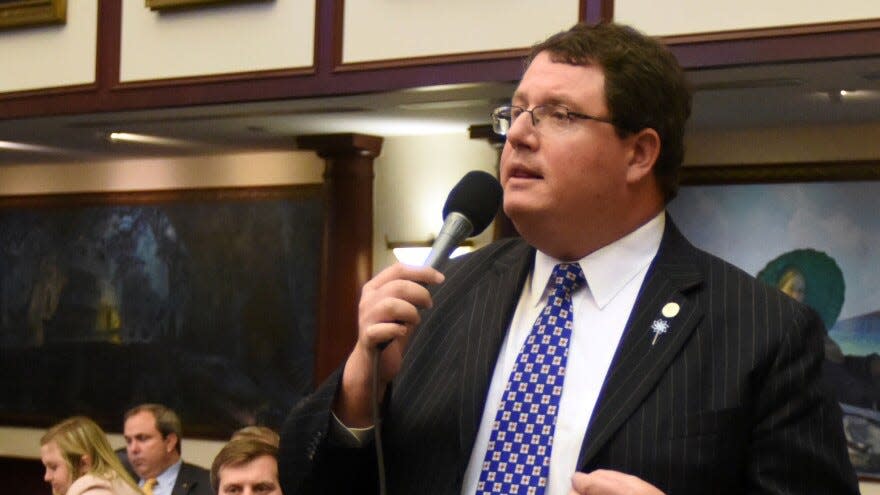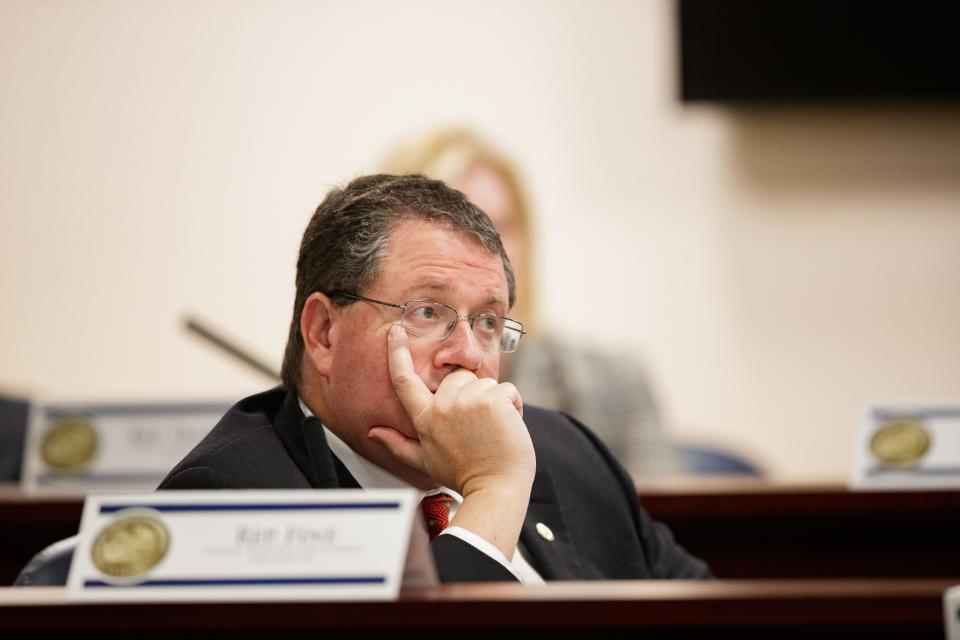Fine's threats to pull funding over Jenkins feud wrong, likely not illegal, experts say
- Oops!Something went wrong.Please try again later.
Florida Rep. Randy Fine's threats to pull funding from the Special Olympics and the city of West Melbourne over a personal feud with a Brevard County School Board member were probably not illegal, and may not even be a violation of the Florida ethics code.
Four experts in law and ethics who spoke to FLORIDA TODAY said that while the threats — revealed over the weekend in a series of text messages released by the city as the result of a public records request — seemed like a clear abuse of power, it's not likely any laws were broken.
It's also far from clear whether Fine would face any administrative sanctions over the incident from the Florida Commission on Ethics.
Previously: State Attorney declines to press charges against Fine over Jenkins feud

Fine has denied making threats and denied telling a West Melbourne councilman he wanted a city attorney who was preparing to release the texts as part of the records request fired.
The responses from experts highlight the gap between what many voters consider unacceptable behavior from elected officials and the laws designed to hold them accountable.
What happened
Fine last week told West Melbourne City Councilman John Dittmore that state funding for the Special Olympics and a city flood risk reduction project was "at risk" because city police officials had invited Brevard School Board member Jennifer Jenkins to participate in a Special Olympics fundraiser held by the West Melbourne Police Department, but failed to invite Fine, according to the series of texts obtained by FLORIDA TODAY.
"Jenkins just put your project and special Olympics funding on the veto list," Fine wrote.
Dittmore said that Fine, in a follow-up phone call, had objected to the release of the text messages as part of a public records request filed by Jenkins, and wanted a city attorney overseeing the request fired.
The $460,000 city project and about $1 million in various appropriations for the Special Olympics were included as part of the recent state budget, passed last month by the Florida Legislature and awaiting DeSantis's signature.
Fine has denied saying he wanted the attorney fired and said he never threatened to have the funding pulled. The "veto list" comment was a remark about the "negative attention" brought to the fundraising event by Jenkins, who he accused of attempting to "politicize" it, he said.
"When you have someone like Jennifer Jenkins come and politicize charity events, it creates problems," Fine said Saturday. "If you want to be in a charity event, fine. But when you go on Facebook and you politicize it, you put it at risk."

Fine did not answer further questions pressing him on the nature of the "risk" he referenced.
Fine and Jenkins have been locked in a bitter public feud over the past year, stemming in part from Fine's anger over Jenkins's support for a Brevard Public Schools mask mandate. The mandate, which was later revoked, at the time ran afoul of an executive order by DeSantis banning school mask mandates.
West Melbourne city attorney Morris Richardson said the city didn't intend to get in the middle of the fight between Fine and Jenkins. Police officials had invited all Brevard School Board members to the fundraiser, and only Jenkins said she would attend.
It's likely not illegal
Some social media observers, including current and former Brevard Democratic party officials Pamela Castellana and Stacey Patel, speculated over the weekend that Fine's actions violated Florida statute 838.021. The statute, which bars attempts to influence public officials by threats of harm, is known as "corruption by threat against a public servant," a third-degree felony.
Randolph Braccialarghe, a professor in the Shepard Broad School of Law at Nova Southeastern University and former state prosecutor in South Florida, said it was unlikely the law would apply in this case.
While noting that "harm" is broadly defined to include "pecuniary" or financial loss or disadvantage, and that investigators and prosecutors are often given some leeway to interpret statute when leveling charges, the law is almost exclusively invoked in cases involving physical threats, Braccialarghe said.
"That statute wasn't for (this kind of case) at all," Braccialarghe said. "It's the kind of thing where, if you arrest so-and-so, I'll kill your family, that type of thing."
Subscribers: Randy Fine: Republican lawmaker's fight with Disney is only his latest battle in culture wars
Attorney and legal ethics expert Jan Jacobowitz said she wasn't aware of any instance in Florida where that statute was applied against an elected official threatening another elected official.
"Not saying it couldn't be," said Jacobowitz, a member of the adjunct faculty at the University of Miami School of Law, adding that she thought it was unlikely in this case.
There are few restrictions on why legislators can support or refuse to support funding, Braccialarghe said, and authorities would be wary of pursuing a charge against Fine under the corruption by threat statute.
That could risk setting a dangerous precedent for freedom of political speech and First Amendment rights more broadly, he said.
"We can't just go criminalizing political disputes, no matter how nasty they might be," he said.
Is it unethical? That's complicated
While Fine's actions may not be criminal, experts said, they seem clearly unethical. But there may not be much that can be done about it.
There are two ways to think about ethics in politics, the experts said. One is a general moral sense among voters of what is considered right and wrong behavior from elected officials. The other is the code of ethics set down in Florida law.
Based on how the laws are written, what might be unethical from the first standpoint may not be a strict violation of the second.
Only the latter can result in official sanctions from the Florida Commission on Ethics, which can run from financial penalties up to impeachment and removal from office depending on the severity of the violation
Jacobowitz, who previously served on the Miami-Dade Commission on Ethics and the Public Trust, said she felt she "wouldn't have a problem" arguing Fine's threats violated the "misuse of public position" provision of the state ethics code.

The provision bars elected officials from "corruptly" using or attempting to use their official position "to secure a special privilege, benefit, or exemption for himself, herself, or others."
"How can we have our state representatives threatening our local councilmen or commissioners? That's just wrong," Jacobowitz said. "That's just backdoor politicking in the most unpleasant way.
However, she said, it was a far from a slam dunk, based on the wording of the statute.
Ben Wilcox, research director for Integrity Florida, a government accountability watchdog based in Tallahassee, said that while Fine's behavior was unethical, it wasn't a clear ethics code violation.
"It seems like an abuse of power. But I'm not sure that's covered in Chapter 112 (the section of the Florida Statutes dealing with ethics for elected officials)," he said.
The ethics code is primarily set up to deal with conflicts of interest, bribery and other forms of misconduct resulting in financial and other tangible personal gains, Wilcox said. It could be argued Fine was gaining some sort of "political benefit," but that would be hard to quantify, he said.
"Whether or not you agree that a state legislator should be threatening and pressuring local government officials, I don't think that's an ethics violation. But it's really questionable whether it's the right thing for him to be doing," Wilcox said.
Nevertheless, political ethics expert Beth Rosenson, an associate professor in political science at the University of Florida, said Fine's actions carried some "pretty deep, profound implications" for the state of government in Florida.
"Personal motivations dominate in a dictatorship. ... Based on personal rule, where a dictator says, 'If you don't bow down to me, you're not going to get what you want,'" said Rosenson, author of "The Shadowlands of Conduct: Ethics and State Politics."
"It's not how the Founding Fathers envisioned democracy working, that people would make decisions based on some petty political feud rather than on the merits of the case," she said.
What would lead to repercussions for Fine?
The experts agreed there were only a couple of ways Fine could face legal or administrative consequences for the incident.
A state attorney or other law enforcement agency could choose to investigate on criminal grounds, they said. More likely, the Ethics Commission would investigate based on a sworn complaint filed by a third party.
Todd Brown, a spokesman for Brevard and Seminole County State Attorney Phil Archer, on Monday told FLORIDA TODAY the State Attorney's Office generally does not "order or initiate in-house criminal inquiries."
"Generally speaking, the process must always begin with the receipt of a sworn affidavit from a person with direct knowledge or evidence of an alleged criminal offense," Brown said in an email, adding those materials would then be transferred to "an authorized law enforcement agency."

Once that inquiry was complete, Brown said, the office would review the findings to determine if there was sufficient evidence of a crime and if any charges filed were likely to succeed at trial.
Not all state attorneys wait on outside agencies to investigate allegations of misconduct, according to Jacobowitz. The Palm Beach County State Attorney's Office, for example, has an in-house public corruption unit that undertakes its own investigations into such complaints, which can be submitted through an anonymous hotline.
That would leave it to independent parties, typically a resident or other whistle-blower with direct knowledge, to file a complaint with the Ethics Commission, which would investigate for possible administrative penalties, Jacobowitz said.
It was unclear Monday whether any such complaint had been filed with the state commission. Jenkins said Saturday she "hadn't even thought" of lodging an ethics complaint against Fine.
"To be perfectly frank, I really just wish somebody else would step up and do the right thing here. It shouldn't be my job to hold this man accountable," Jenkins said.
In the absence of official repercussions, the experts said there is always one other recourse: vote Fine out of office.
"In some cases," said Wilcox, of Integrity Florida, "the only way to hold a public official accountable is at the ballot box."
Eric Rogers is a watchdog reporter for FLORIDA TODAY. Contact Rogers at 321-242-3717 or esrogers@floridatoday.com. Follow him on Twitter @EricRogersFT.
This article originally appeared on Florida Today: State Rep. Randy Fine's threats to pull Special Olympics funding not illegal, experts say

